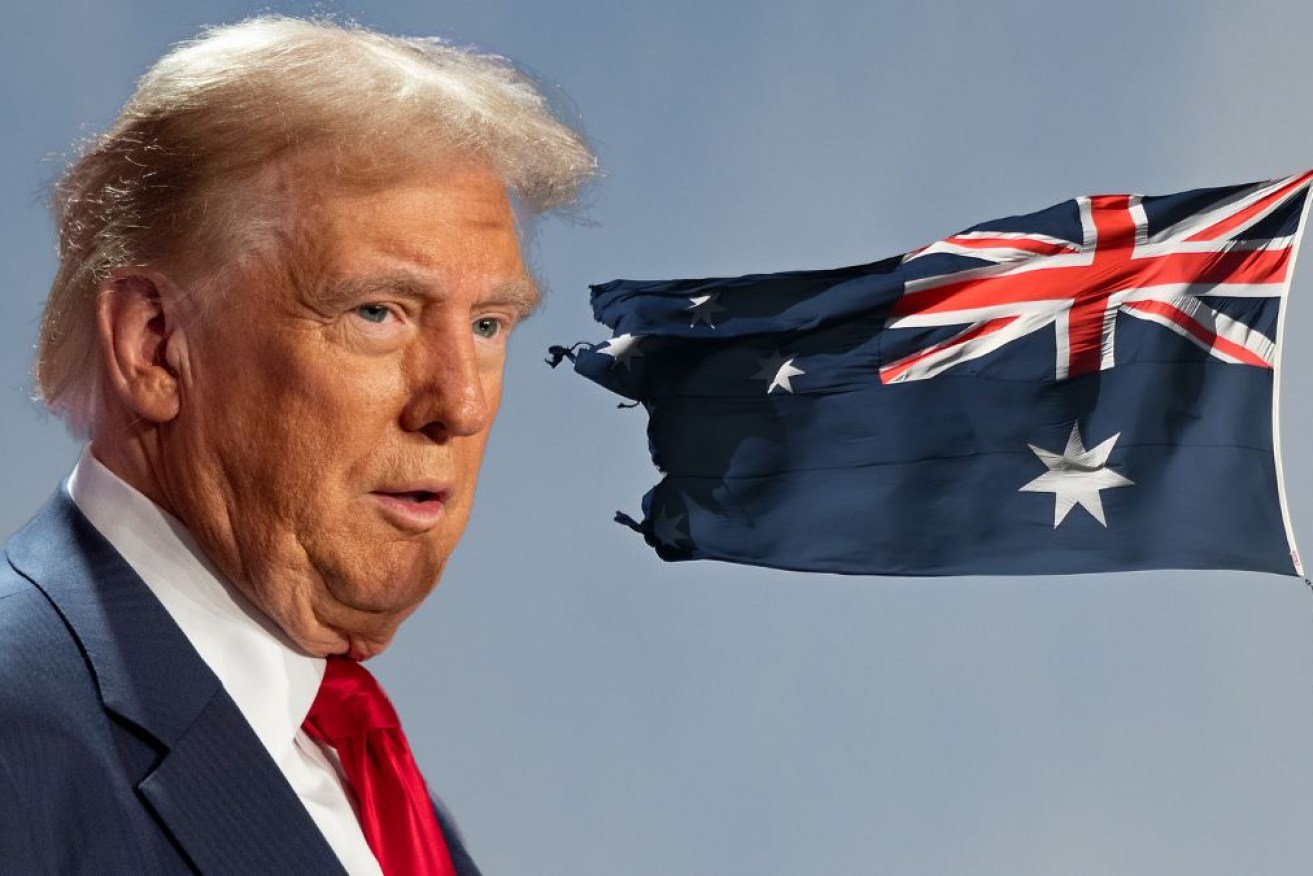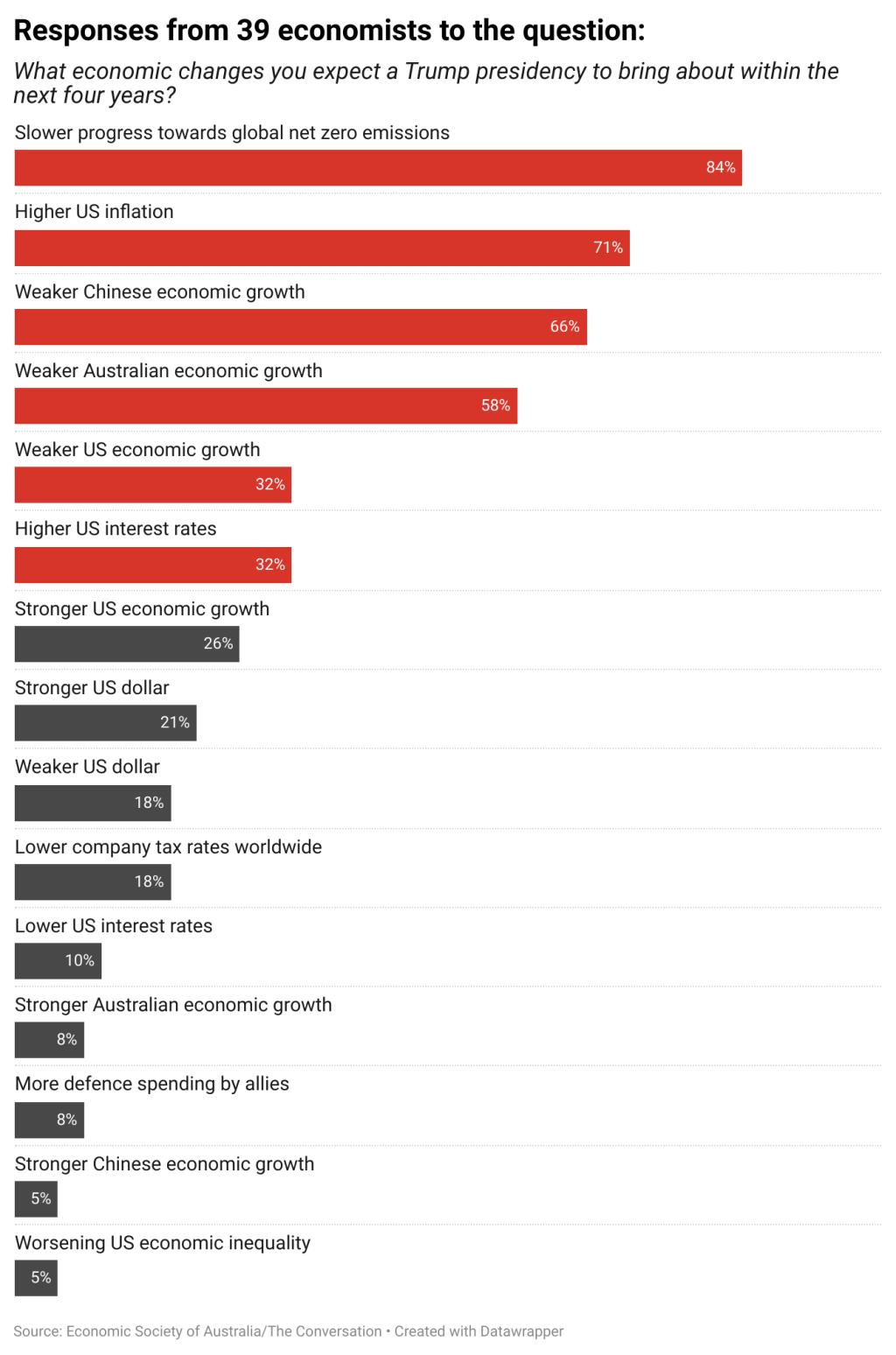Top Australian economists warn of the effect of Trump’s policies

Leading economists have sounded the alarm about the effect of a second Trump presidency on Australia. Photos: AAP/TND
The incoming Trump administration will further harm already-weak economic growth in Australia while sparking a resurgence of inflation in the US, according to a group of leading economists.
The group of 39 economists surveyed by the Economic Society said the surge in US inflation would ultimately be curbed by higher interest rates.
Invited to pick items from a list of 14 possible outcomes and given an opportunity to identify others, the experts nominated “slower progress towards global net zero emissions” as the most certain outcome of a Trump presidency, expected by 84 per cent of those surveyed.
The next most certain were higher US inflation (expected by 71 per cent), weaker Chinese economic growth (66 per cent) and weaker Australian economic growth (58 per cent).
 The experts are members of a panel of some 70 economists recognised by their peers as leaders in their fields including economic modelling, macroeconomics and labour markets.
The experts are members of a panel of some 70 economists recognised by their peers as leaders in their fields including economic modelling, macroeconomics and labour markets.
Among them are former Reserve Bank, Treasury, International Monetary Fund and Organisation for Economic Co-operation and Development officials.
Higher US inflation would be the most immediate effect. The respondents pointed to three Trump policies that will put upward pressure on prices:
higher tariffs on imported goods
deportation of illegal migrants, creating labour shortages
company tax cuts that should boost economic growth and prices
Australian National University economist Jenny Gordon said Trump’s policies will “put the foot on the accelerator” of US economic growth as they further incentivise (US and other) firms to invest.
“Combine that with tax cuts and you will have a lot of money chasing labour in an already tight labour market, higher inflation is inevitable,” she said.
University of Queensland economist Alicia Rambaldi said how the new president handled the resurgence of inflation might itself damage the economy.
“Mr Trump might see this as a failure of those that have been appointed instead of the policies of his administration, which could lead to the return of the revolving door that characterised his first term as President,” she said.
Independent economist Saul Eslake said short-term US interest rates might be lower than otherwise “to the extent that Trump succeeds in eroding the independence of the Federal Reserve, either by ‘stacking’ it with toadies (as he did the Supreme Court) or finding a way to override its decisions.”
He said depending on the extent that he is successful in that regard, long-term rates will likely be higher than otherwise.
The panel expects Australian economic growth to take hits from both higher US inflation (which should put upward pressure on Australian inflation) and from higher US tariffs on imports from China (which should depress China’s economic growth demand for Australian resources).
Partly offsetting this could be opportunities for Australia to seize leadership in the production of clean energy from the US, to benefit from a redirection of Chinese foreign students away from the US, and to export iron ore and other resources to the countries the US turns to instead of China.
Economic consultant Rana Roy said he doubted China would suffer much from the higher US tariffs, adding that they might even help.
China had too much investment, too much manufacturing for export and not enough consumer spending, he said. A rebalancing might result in stronger and more sustainable growth.
While deeply concerned about the consequences of Trump’s plan to deport millions of undocumented immigrants, several of the panellists expressed doubt that much of it would actually happen.
Among the challenges would be building detention camps, directing the US military to take part in a domestic operation and overcoming opposition from state administrations and possibly the Supreme Court.
Although the panel’s overwhelming view was that the incoming president’s promise to withdraw from the Paris climate change agreement would slow progress towards global net zero emissions, energy expert Frank Jotzo thought the effect “might not be as great as one might think”.
In the US and elsewhere the clean energy transition was underway regardless of government policy, and legislated support for emerging green industries in the US would be hard to remove.
The biggest effects of the Trump program identified unprompted concerned uncertainty, democracy and social inclusion.
Nine members of the panel mentioned uncertainty unprompted. It could be damaging in its own right, limiting the risks people were prepared to take and increasing the risk of making bad decisions.
Jotzo said the really big worries concerned the future of democracy, security and geopolitics, and social and humanitarian damage.
University of Western Australia economist Alison Preson said Trump’s program would have a chilling and harmful effect on diversity, equity, inclusion and economic growth.
“Trump’s misogyny and disrespect for women will see the clock wound back on women’s rights, and violence against women can be expected to increase. The setback will be immense and will have considerable flow-on effects, affecting decisions from fertility through to education and work.”
The effects would not be limited to the US. While it was hard to say what the economic cost of the retrograde policies concerning women would be, but it was safe to assume they would be in the billions of dollars.
University of Queensland economist John Quiggin said the threat to US democracy would have more profound implications than the threats to its economic policy, though it is hard to say how it would play out.
Detailed responses from each of the 39 economists are available here: https://esacentral.org.au/polls
No comments:
Post a Comment